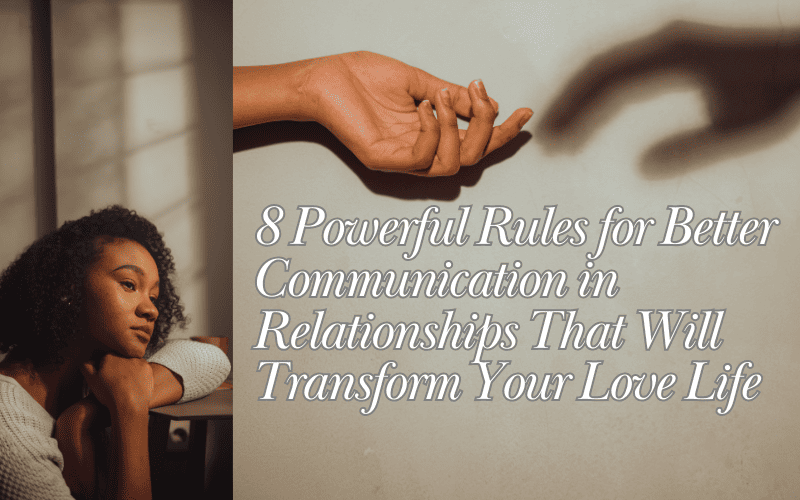Communication in relationships is the make-or-break factor that determines whether couples thrive together or drift apart. With divorce rates climbing and 7 out of 10 marriages ending in separation, it’s clear that most couples struggle not with money or living arrangements, but with the fundamental ability to understand and connect with each other.
If you’ve ever felt like you’re speaking different languages with your partner, you’re not alone. The good news? Mastering communication in relationships doesn’t require a psychology degree – just the right tools and mindset shifts that can transform how you connect with your significant other.
Why Communication in Relationships Becomes More Challenging Over Time
Here’s something fascinating: we often find it easier to open up to strangers on a train than to our own partners. There’s a psychological reason for this “traveler effect” – with strangers, we have nothing to lose. But with our loved ones, we overthink everything: Will this hurt them? Are they too tired? Should I even bring this up?
This protective instinct, while well-intentioned, creates emotional distance. Problems accumulate like a snowball rolling downhill until they become overwhelming enough to derail the entire relationship.
According to relationship experts, couples who communicate effectively are significantly more likely to have lasting, satisfying relationships. The key is understanding that effective communication in relationships requires specific skills that most of us were never taught.



The 8 Golden Rules for Better Communication in Relationships
1. Renegotiate Your Relationship Contract Regularly
Remember who you were when you first got together? You’ve both changed since then – your goals, values, and life circumstances have evolved. Yet many couples operate under the assumption that their initial “contract” should last forever.
The Reality Check: Your relationship needs regular updates, just like software. Communication in relationships means having ongoing conversations about where you both stand now, not where you were five years ago.
How to Apply This:
- Schedule quarterly “relationship check-ins”
- Discuss how your individual goals have changed
- Be willing to compromise on things that matter to both of you
For example, if one partner initially agreed to annual fishing trips but now finds them unbearable, it’s time to explore alternatives that work for both parties. Maybe separate vacations, or finding destinations that offer both beach relaxation and fishing opportunities.
2. Think Beyond “Me” – Focus on “Us”
One of the biggest shifts in improving communication in relationships is moving from individual perspectives to a partnership mindset. Psychology research shows that couples who can see situations from three positions – yours, theirs, and the relationship’s – navigate conflicts more successfully.
The Three-Position Approach:
- Position 1: How do I feel about this situation?
- Position 2: How would I feel if I were in their shoes?
- Position 3: What would be best for our relationship as a whole?
Try implementing monthly “relationship planning sessions” where you discuss what’s working well and what needs attention. Create a safe space with candles, tea, and no distractions to focus entirely on your partnership.
3. Create Sacred Rituals Just for You Two
Communication in relationships flourishes when couples prioritize dedicated time together. Not just watching Netflix or handling household tasks, but intentional moments focused solely on each other.
Ritual Ideas That Work:
- Weekly date nights (even if it’s just a walk in the park)
- Taking turns planning weekend activities
- Monthly mini-adventures or new experiences together
- Daily 10-minute check-ins without phones
One couple I know alternates weekend planning – she chooses one weekend’s activities, he chooses the next. The only rule? Both partners have veto power over extreme activities they absolutely won’t enjoy.
4. Explore New Contexts Together
We often know our partners only in their familiar roles – parent, spouse, household manager. But communication in relationships deepens when you discover new sides of each other.
Ways to Create New Contexts:
- Take up a sport or hobby together
- Attend workshops or classes
- Travel to new places
- Join a book club or discussion group
- Try activities neither of you has done before
Consider gifting experiences rather than things. One creative idea: create a “monthly adventure box” with 12 different activities to try throughout the year – from fencing lessons to wine tasting to art classes.
5. Have the Hard Conversations Before They Become Crises
This is perhaps the most crucial rule for communication in relationships, and the one most couples avoid. We’re conditioned to “keep the peace” and avoid conflict, but this approach often leads to explosive arguments or gradual emotional disconnection.
The Managed Crisis Approach:
- Address issues when they’re small and manageable
- Use “I” statements to express your feelings
- Focus on solutions rather than blame
- Schedule these conversations when both partners are calm and rested
The goal isn’t to avoid all conflict – it’s to have productive disagreements that strengthen your bond rather than tear it apart. Research from the Gottman Institute shows that couples who address issues head-on have stronger, more lasting relationships.
6. Eliminate Hints and Communicate Directly
Men and women often process information differently. What seems “obvious” to one partner may be completely invisible to the other. Effective communication in relationships requires clarity and directness.
Instead of: “I thought you’d understand…” Try: “I need you to know that…”
Instead of: “It should be obvious that…” Try: “I’d really appreciate it if you could…”
Real Example: If you want your partner to acknowledge your housework efforts, don’t hint by sighing dramatically. Instead, say: “I spent a lot of energy cleaning today because I wanted you to come home to a beautiful space. It would mean a lot to me if you noticed these efforts.”
7. Respect Each Other’s Need for Personal Space
Not every moment of silence or desire for alone time signals relationship problems. Communication in relationships also means understanding when NOT to communicate – when your partner needs space to recharge.
Healthy Boundaries Include:
- Respecting different social needs (introvert vs. extrovert)
- Allowing individual hobbies and friendships
- Understanding that processing time varies between individuals
- Creating space for personal growth and self-reflection
Remember the joke about the mother who locked herself in her room weekly? When her curious family finally discovered her “secret,” they found her simply reading and eating chocolates. Her response: “I’m making you a happy mother.”
8. Don’t Take Everything Personally
This final rule for communication in relationships can be the most challenging to implement. Sometimes your partner’s reaction has nothing to do with you – they might be stressed from work, dealing with family issues, or simply having a bad day.
Before Assuming It’s About You:
- Ask if it’s a good time to talk
- Consider external stressors they might be facing
- Suggest taking a break and revisiting the conversation later
- Remember that everyone has emotional ups and downs
The Pause Strategy: When your partner seems irritable or distant, try saying: “It seems like you might need some space right now. Would it be better to continue this conversation later when you’re feeling more settled?”
Making These Rules Work in Real Life
Implementing better communication in relationships doesn’t happen overnight. Start with one or two rules that resonate most with your current situation. Practice them consistently for a few weeks before adding more.
Getting Started:
- Choose the rule that addresses your biggest current challenge
- Discuss these concepts with your partner when you’re both relaxed
- Set up systems (like monthly check-ins) to maintain new habits
- Be patient with yourself and your partner as you develop these skills
Remember, communication in relationships is a skill that improves with practice. Every couple will have their own unique style and preferences, but these foundational rules provide a framework for deeper connection and understanding.
Your Next Steps
The strongest relationships aren’t built on perfection – they’re built on two people committed to growing together and working through challenges as a team. By implementing these communication strategies, you’re investing in a partnership that can weather any storm and continue growing stronger over time.
What communication challenges are you facing in your relationship? Which of these rules resonates most with your current situation? Remember, every small step toward better communication in relationships creates positive ripple effects that strengthen your bond and deepen your connection.
The key is to start somewhere, be consistent, and remember that building better communication in relationships is a journey worth taking together.
Looking for more relationship advice and lifestyle tips? Subscribe to Lady Vibe Style for weekly insights on creating your best life and strongest relationships.




